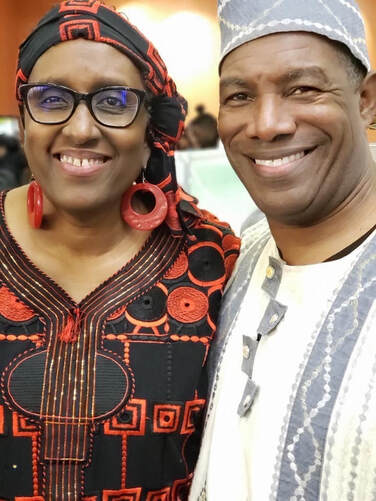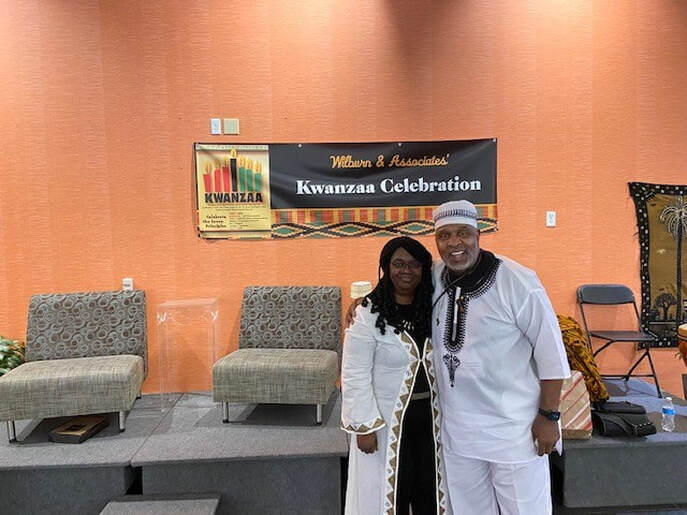 \ By Denise Stripes for Wilburn & Associates On 29 December, 2019, Wilburn and Associates, in conjunction with North-west Winterfest, held their second annual Kwanzaa Celebration, immersing a corner of Spokane’s Northtown Mall in the beauty of African culture. The area was tucked away from the mall traffic, and the décor—as well as the aromas of the foods crafted by local vendors—offered a warm and intimate setting rather than the sterile environment one would expect in a mall. The walls were painted in warm colors and graced with beautiful African art. Just behind the dais, a small tapestry presented a village scene, with palms and other trees, a hut, and people working under the sun—a representation of community, the central theme of Kwanzaa. On the dais, two chairs presided, anticipating the arrival of the Kwanzaa King and Queen; at their side, African djembe awaited their cue to provide the musical backdrop for the celebration. Just before the dais stood the kinara, a holder for the mishumaa saba, the seven candles. The gathering of spectators included people from a medley of ethnicities who came to share in the festival, which illuminated, for those of us without a clue, the meaning and spirit of Kwanzaa. The observance began with some ceremony; we stood as James and Roberta Wilburn heralded with drums the arrival of the Kwanzaa Queen, Stephy Nobles Beans, and the Kwanzaa King, Cecil Jackson. When the Queen and King were seated, James Wilburn signaled with the drum the beginning of the offering of libations. Roberta Wilburn later explained to me the meaning of this tradition, asserting that, while she would not normally cite Wikipedia, it actually gives a good definition for libations: “In African cultures […], the ritual [generally performed by an elder] of pouring libation is an essential ceremonial tradition and a way of giving homage to the ancestors. […] A prayer is offered in the form of libations, calling the ancestors to attend.” To put this African tradition into the context of the African-American celebration, James Wilburn adds, “Libations is contributing your being and success to those who sacrificed for you being here. Libations are done in threes because three is the biblical number of completion. You pay libation three times, recalling what your ancestors did that made it possible for you to do or be able to do the things you want to do.” In the course of the ceremony, James honored those who struggled and survived, citing several key events, in three stages, and pouring libations for each stage. The first period represented the struggle for freedom, and spanned from the first Africans who arrived in 1619 off the Virginia Coast and were made slaves to the abolishment of slavery in 1835. It is important to note that these first arrivals did not come here as slaves; they were poets, royalty, fathers, mothers, elders, and citizens from all walks of life, who lived in freedom and dignity, but had that stripped from them. Forced into slavery, they were not, in and of themselves, slaves. The second stage represented the struggle for citizenship and equal rights; Wilburn cited the 1868 ratification of the Fourteenth Amendment to the Constitution, which finally recognized the inherent rights of the freed people to equality and citizenship. The third stage gave homage to those who struggled for the right to vote, citing the 1870 ratification of the Fifteenth Amendment, which implemented the right of African-American men to vote, and the securing of the right for women to vote in 1920. After the libations were offered, Roberta Wilburn gave a brief history of Kwanzaa, explaining the symbols, the seven principles, and the colors. Kwanzaa is a seven-day celebration, not a religious festival, but an homage to family, culture, and community. The seven days of Kwanzaa exemplify the seven principles: Umoja, Unity in the family, community, nation, and race; Kujichagulia, Self-Determination, that the people will define, name, create for, and speak for themselves; Ujima, Collective Work and Responsibility, to build and maintain the community; Ujamaa, Cooperative Economics, to build and maintain the community’s businesses; Nia, purpose, to build the community in order to restore the people to their traditional greatness; Kuumba, Creativity, to leave the community more beautiful and beneficial than they inherited it; and Imani, Faith, to believe in the people, and in the righteousness and victory of their struggle. The kinara holds the mishumaa saba, the seven candles that light the way, presented in three colors: three green candles for the land of Africa, three red for the blood that was shed in the struggle, and one black candle for the people, to show that black skin is not a badge of shame. On a mkeka, a mat representing the history, stands the kinara and the Kikombe chaumoja, the cup that represents unity; the mazao, or fruits and vegetables for the harvest; the muhindi, ears of corn that exemplify the children and the future; and zawadi, gifts for the children. Since 29 December marked the fourth day of Kwanzaa, JaNese Howard and Roberta Wilburn lit four of the candles on the kinara, and then Olynda Stone, in her beautiful voice, praised God, singing, “Lord I will lift my eyes to the Hills,” a powerful message from Psalm 121:1 about looking to God for help during hardships. While Kwanzaa celebrates community rather than religion, faith is an integral part of a community, another way to unite a people. This principle was also reflected in the performance from the Spokane Community Gospel Mass Choir. The ceremony continued with Gaye Hallman’s poem about the seven principles and how they work together, Mona Martin’s beautiful dance, James Wilburn’s drums, and Lillie Pirie, who read a children’s story called “The Feast.” Michael Bethely gave a poem titled “To You,” telling the beauty of the people: “You are imperfect, and that is flawless,” and JaNese Howard spoke from a teenage perspective, saying, “I stand here today as a strong black girl…It’s so important for me to know who I am and where I come from.” Howard concluded by proclaiming, “I am a queen; I am beautiful; I am worthy; I am Kwanzaa.” The Kwanzaa Queen, Stephy Nobles Beans, recited a poem extolling the beauty of the African countries, with the antiphon, “Way down in my soul.” With her many accomplishments here in the United States, her African roots remain in her soul, an inspiration to her and to those in her sphere of influence. Cecil Jackson, Kwanzaa King, who works with young people in track, as well as encouraging them to finish school, spoke of the graduation rates of young black people, stressing the importance of getting involved and being part of the solution. He also shed light on Kwanzaa’s fourth principle, speaking of the importance of a “co-op economy,” the keys to which are: first, supporting one another; second, strength in numbers; and third, faith in one another. Lastly, James Wilburn stressed the importance of those who lived through the atrocities of the past with the story of the djembe. These drums were used in Africa to communicate between people, tribes, and countries, and James told how the slaves would entertain their masters with the drums, all the while using the drums to communicate and free the people. They demonstrated the principle of striving and thriving, when the masters took the drums away, by tapping the same messages with their feet. One of an oppressor’s most insidious tools is to remove the means of communication from the oppressed. By maintaining communication through innovation, among other accomplishments, these men and women fought for the future of their people, and paved the way for all who persevered through the days of Jim Crow laws and the Ku Klux Klan, and for those who continue the struggle today, and who honor their forebears in the spirit of Kwanzaa.
2 Comments
|
AUTHORRoberta Wilburn is an Inclusion Practitioner with over 35 years of experience working in higher education, and as a consultant in public and private K-12 schools, government, non-profit and community based organizations. She has conducted diversity, equity, and inclusion training regionally, nationally, and internationally. She is the author of books, chapters, and journal articles. Her work has been recognized with local and national awards. Some of her awards include the 2017 Insight Into Diversity Giving Back Award for Administrators in Higher Education, the YWCA Women of Achievement Carl Maxey Racial and social Justice Award, and the Heartwood Award for Cultural Enrichment and Community Service.
ASSOCIATE BLOGGERDenise Stripes has lived in Spokane, Washington for twenty years. She is a wife of a veteran and has three adult children. She is also an adjunct English instructor at Spokane Community College. She earned her doctorate in English Literature from Washington State University. Above all, Denise is a committed believer in Jesus Christ, and wishes to see justice in her community as Christ would show it. She is a firm advocate of the Courageous Conversation, and is honored to write guest blogs about the events facilitated by Wilburn and Associates, LLC.
Archives
April 2020
Categories |


 RSS Feed
RSS Feed